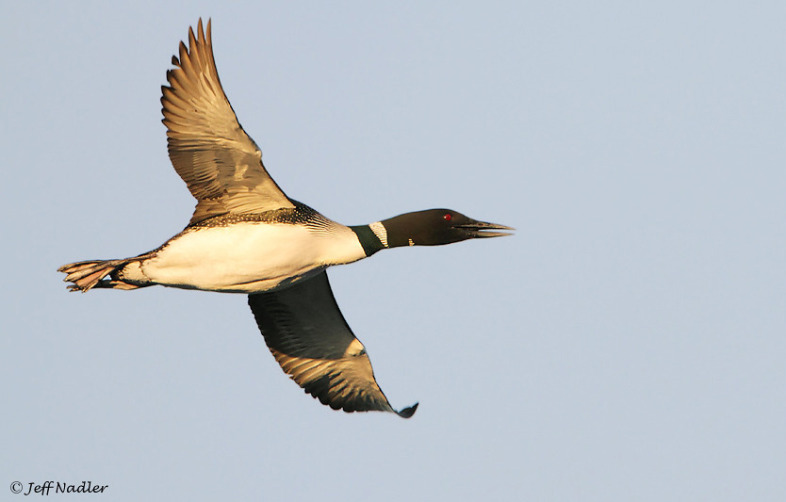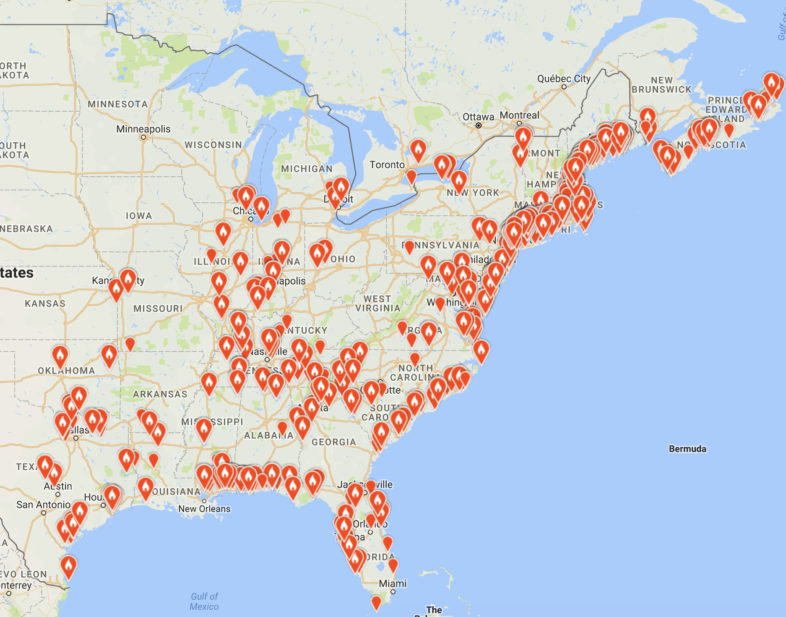
Common Loon in flight. / © Jeff Nadler
As Red-winged Blackbirds and other early migrants begin arriving in Vermont, where are the Common Loons that will reappear on our still-frozen lakes next month? March eBird maps show Common Loons are reported along the coast from the Canadian Maritimes to the Gulf of Mexico, with some found inland on areas that are ice free. There are even a few loons on the open waters of southern Lake Champlain.
Recent satellite telemetry studies, as well as sightings of banded birds, reveal that most New England loons winter off the Northeast coast. Generally, breeding loons from further west in Ontario will travel further south to the Chesapeake and the Carolinas, while loons from the Midwest often spend the winters in the Gulf of Mexico. Loons breeding further west in Alberta and British Columbia spend winters along the Pacific coast.

Common Loon sightings reported to eBird from March 1 to 8. Click on the map to see the latest March reports and add your sightings.
Biodiversity Research Institute and the U.S. Geological Survey, which have spearheaded studies of loon winter ecology, have made some interesting discoveries. Male loons nesting in Maine tended to stay off the Maine coast during winter, while their female counterparts ventured further south, ending up from Cape Cod to Chincoteague, MD. Is this a strategy that enables the earliest possible return by males to their breeding lakes, shortly after ice melt? It is now known that many wintering loons return to the same area year after year, paralleling their strong breeding site fidelity in summer. Most loons occupy a 10-20 square km “home range” area for the duration of the winter. A 2015 paper by Jim Paruk in Condor: Ornithological Applications noted that site-faithful loons likely gain fitness and survivorship advantages via local knowledge of a discrete wintering area.
As winter transforms into spring during the coming weeks, loons will bide their time on open waters, waiting for the right moment return to breeding areas, anticipating ice-free lakes. In years of late ice-out, volunteers have observed flyovers of loons inspecting the lake country, but with no place to land. These birds likely retreat to await another exploratory flight. In early ice-out years, we rarely hear about loons showing up earlier than expected. They have a schedule, an internal clock, an ingrained time table for spring migration.
If you travel to the coast this late winter or early spring, bring binoculars and scan the nearshore waters. You’ll likely find a loon, and you might be lucky enough to hear one call. And be sure to add all of your sightings to eBird.

I noted a loon on Walden Pond in Concord, Mass. and heard it call in early April 2003, to my great surprise and delight!
Have heard loons today, March 31,2020 in Maine. Still some ice on the lake in the smaller coves but lions are here!
In the northwest corner of South Carolina, as many as 120+ loons are found (and studied, by Dr. Paruk among others) on Lake Jocassee. Yesterday (March 31, 2023) 167 Common loons took off in a 10 minute time frame. Intense!
We are in southeast Wisconsin. They come and visit us in March (yes when the ice goes and when the sun can penetrate to start the lake-bottom plants growth)and stay as long as a month or so before heading further north where the lakes are not as busy (our thought about why). Over the last 20 years we have seen a dramatic increase in the number of loons and the length of time they stay. In spring and fall. I’m unsure exactly what is happening but it feels like we may get to a point where they might summer with us.